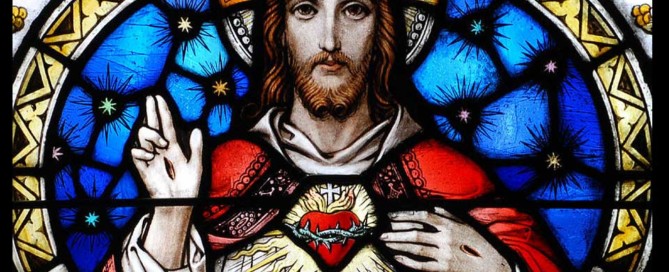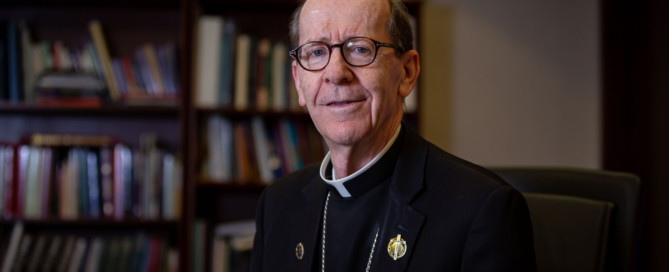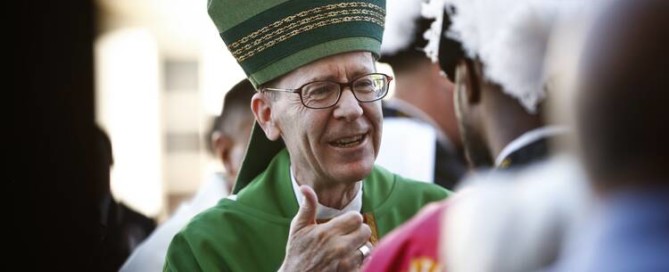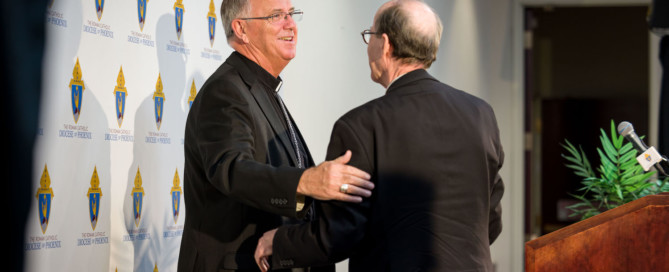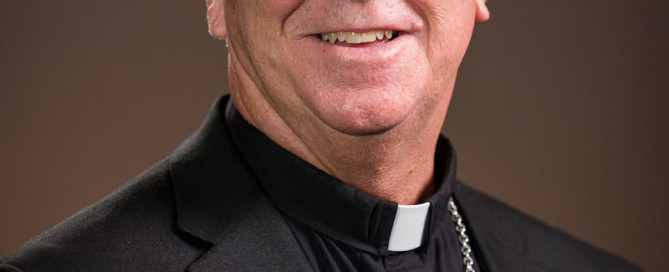Welcome to Our New Website!
Honoring, cherishing, worshipping Christ
Honoring, cherishing, worshipping Christ
The Most Sacred Heart of Jesus
Following is the prepared text for Bishop Olmsted’s homily for the Solemnity of the Most Sacred Heart of Jesus.
June 24, 2022
“I myself will look after and tend my sheep… The lost I will seek out; the strayed I will bring back… the sick I will heal” (Ezek 34:11-16).
In an interview on April 10, 2005, George Weigel made the following observation about what shapes human history:
“…history doesn’t work the way we often suppose. For the past two hundred years, people in the Western world have thought of history as the product of politics — by which they mean the struggle for power, [and] economics — by which they mean the struggle for wealth; or some combination of the two. But … what drives history over the long haul is neither politics nor economics, but culture — what men and women honor, cherish and worship. Change the culture — inspire the culture — and you can bend history in directions that seem impossible on a narrower, political or economic reading of the signs of the times.”
Even though politics and economics have a part to play in shaping society, a much more profound culture is built by what we honor, cherish, and worship. We gather in prayer tonight because we honor, cherish, and worship the Most Sacred Heart of Jesus.
It is a great joy and blessing for me to celebrate this Solemnity of the Most Sacred Heart of Jesus on the historic day when the U.S. Supreme Court overturned Roe v Wade. It is more than a coincidence that it occurred on this great Feast of our Redeemer. What could be more precious to the Heart of Jesus than the lives of the most vulnerable and innocent among us? Roe v Wade led to the destruction of more than 60 million lives while it sowed seeds of confusion in our moral conscience and nation’s laws.
Today we begin the long road to heal from this terrible wound. Dobbs v Jackson put an end to an unjust law that for 49 years has denied tens of millions of children the right to be born. We mourn their loss and entrust their souls to our merciful God. At the same time, we must prepare for the spiritual battle that lies ahead. The Dobbs decision allows us to begin new work: healing wounds and repairing divisions in society, building a culture that supports marriages and families, and offering support and resources for each woman to bring her child into the world redeemed by the pierced Heart of Christ.
The Sacred Heart of Jesus incarnates the love of God for the whole world. The center of the Good News is found in three words: Jesus’ Sacred Heart. How do we know God’s love? How do we experience His love and make it our own except through the humanity of Jesus? Thus, St. Paul writes, in his Letter to the Romans, “…God proves His love for us in that while we were still sinners Christ died for us” (Rom 5:8).
The love of God is amazing. He entices us, attracts us, fascinates us, and captures our imagination in the most unusual ways. The Son of God, the eternal Word of the Father, becomes flesh. Jesus enters the poverty and brokenness of our humanity; He takes on Himself the depravity of our sins. He dies for us on the Cross. Dying, He destroyed our death; rising, He restored our life. This is what transforms a civilization of divisiveness into a civilization of love, a culture of death into a culture of life. The Most Sacred Heart of Jesus shapes human history, including the history of the Servants of the Pierced Hearts of Jesus and Mary, and the history of every one of us.
St. Catherine of Siena begins one of her prayers in this way, “O immeasurable love! O gentle love! Eternal fire! You are that fire ever blazing…” (#9). Throughout her prayers, St. Catherine will break forth in similar exclamations of awestruck wonder: “O boundless, gentlest charity! O Gentle Truth! O first and deep well of charity!”
What Catherine is describing here is the Most Sacred Heart of Jesus. This fountain of God’s love is the reason you and I are here this evening. It is why we worship and adore the Lord with the deepest reverence, gratitude, and praise. But how does the Most Sacred Heart of Jesus get our attention? How does He speak to our hearts and draw us closer to His own? How does He make us eager to love Him in return and to work with Him to build a culture of life?
He leads us into the desert. He hides His beauty “from the wise and the learned” while He reveals it “to little ones.”
Jessica Powers captures well this unusual way God catches the attention of our hearts. In a poem, she writes:
“God is the strangest of all lovers; His ways are past explaining. He sets His heart on a soul; He says to Himself, “Here will I rest my love. But He does not woo her with flowers or jewels or words that are set to music, no names endearing, no kindled praise…
He stalks the soul with sorrows; He tramples the bloom; He blots the sun that could make her vision dim…, and then He comes and there is nothing in the vast world but Him and her love of Him.
Not till the great rebellions die and her will is safe in His hands forever does He open the door of light and His tendernesses fall, and then for what is seen in the soul’s virgin places, for what is heard in the heart, there is no speech at all.
God is a strange lover; the story of His love is most surprising. There is no proud queen in her cloth of gold; over and over again there is only, deep in the soul, a poor disheveled woman weeping… For us who have need of a picture and words: the Magdalen!”
Jesus reminds us of this strange yet deep love of His Sacred Heart when, in today’s Gospel He says, “…there will be more joy in heaven over one sinner who repents than over ninety-nine righteous people who have no need of repentance” (Lk 15:7).
It is God who builds a culture of life. It is all His work. As Psalmist says, “Unless the Lord builds the house, they labor in vain who build it.” But He chooses to do His building through people like you and me, through the “least ones in the Kingdom of God.”
The littler we are, the more we allow God to empty us of pride, the more likely it is that we will not get in the way of the Master Builder. The more our hearts are humbly surrendered to His Most Sacred Heart, the more we honor, cherish and worship Him, the more He will act in us and through us, building a culture of life and a civilization of love, building the Kingdom of God.
Roman Catholic Diocese of Phoenix Statement on Dobbs vs. Jackson Women’s Health Decision of the Supreme Court
Roman Catholic Diocese of Phoenix Statement on Dobbs vs. Jackson Women’s Health Decision of the Supreme Court
June 24, 2022
PHOENIX — “You formed my inmost being; you knit me in my mother’s womb. I praise you because I am wonderfully made; wonderful are your works!” (Psalm 139:13-14)
“Every human life, from conception to natural death, no matter the circumstances, is a direct gift from God.
“With today’s decision of the U.S. Supreme Court, in Dobbs v. Jackson, I rejoice that our country has begun to repair the damage done to our nation by the catastrophes of Roe v. Wade and Planned Parenthood v. Casey—two Court decisions that led to the destruction of more than 60 million lives and confused our nation’s laws and moral conscience. It is providential that this decision was released on the Feast of the Most Sacred Heart of Jesus.
“Today we can begin to heal from this wound. I gratefully join my voice to the clear Statement of the US Bishops in response to this decision.
“For decades, those in the Pro-Life movement have prayed, sacrificed, peacefully demonstrated, and walked with mothers in need to uphold the dignity of every human life.
“Let today’s decision be a turning point for our nation—the day we renew our commitment to uphold the inalienable rights in the Declaration of Independence and build a culture of life and civilization of love. Let us redouble our efforts to accompany mothers in need, act as peacemakers with all our fellow citizens, strengthen laws that protect innocent life, and proclaim the dignity of every human person, each of whom is made in the image of our loving God.”
Most Rev. Thomas J. Olmsted, Apostolic Administrator
Most Rev. Eduardo A. Nevares, Auxiliary Bishop of Phoenix
Courageous prophet or anti-Francis culture warrior? The Bishop Olmsted I knew was simply a pastor.
By J.D. Long-García
It was late. I was the editor of a diocesan newspaper, and I had logged extra hours that day to prepare the latest issue to go to press. It must have been between 10 and 11 p.m. by the time I took the elevator down to the subterranean garage at the chancery.
I was surprised to hear boisterous chatter when the elevator doors opened. I peeked around the corner to see Sergio, the security guard, prattling on. Now, Sergio did not fit any security guard stereotypes. He was timid, soft-spoken and did not make a lot of eye contact. Bit of a conflict-averse wallflower.
I had worked with Sergio for years but had never seen him this animated. He was smiling with his eyes wide, emphasizing his words with his hands and laughing. It seemed like the person he was speaking to was having a tough time getting a word in. I peeked a little further around the corner and saw Sergio speaking with Bishop Thomas J. Olmsted.
Welcoming Bishop Dolan to Phoenix
Following is the prepared text for Bishop Olmsted’s remarks upon the acceptance of his retirement and the appointment of Most Rev. John P. Dolan, Auxiliary Bishop of San Diego, as 5th bishop of the Diocese of Phoenix.
June 10, 2022
It is my honor to welcome our new bishop to the Diocese of Phoenix. I give thanks to God and our Holy Father Pope Francis for sending us a brother bishop and one of the most respected priests of the Diocese of San Diego.
Bishop John Dolan brings with him many years of dedicated service and pastoral leadership in a diocese built on the inspiring legacy of St. Junipero Serra.
As a priest, Bishop Dolan served as pastor of several large parishes with thriving schools and growing populations. More recently, he has served as Vicar for Priests and Vicar General. This means he has many years of valuable experience of working with school boards, finance councils, priests and deacons in deanery meetings, diocesan staff, civic officials, and the joy of priestly fraternity.
Being a native son of California, Your Excellency, you are well acquainted with the zeal and apostolic holiness of St. Junipero Serra. Here in Arizona, you will come to know another great missionary who labored tirelessly to share the Gospel of Christ with the Native people of southern Arizona and northern Mexico: Padre Eusebio Kino of the Society of Jesus.
My brother in Christ, you will also find joy in coming to know and collaborate with the many faithful priests, deacons, men and women religious, and talented lay leaders who have been my closest collaborators and truly missionary disciples of Jesus.
Even though you have spent your life in service of Christ near the Pacific Ocean of California, I know you will appreciate the beauty of the desert and those whom Jesus has called to be his faithful witnesses here.
My brothers and sisters in Christ, I have no doubt that you will quickly come to know our new bishop’s joyful spirit and generous heart, who, like me, gives thanks each day for the love of Jesus and the honor to be His servant.
Please join me in welcoming Bishop John Dolan.
Meet the 5th bishop of the Diocese of Phoenix
Meet the 5th bishop of the Diocese of Phoenix
Following is the prepared text for Bishop Dolan’s remarks upon his appointment as 5th bishop of the Diocese of Phoenix.
June 10, 2022
At this new chapter in my life and ministry, I am filled with deep gratitude that the Lord, who has been at my side, remains faithful to me as I begin my service to the people of God here in the Diocese of Phoenix.
En este nuevo capítulo de mi vida y ministerio, estoy lleno de profunda gratitud, porque el Señor que ha estado a mi lado permanece fiel a mí al comenzar mi servicio al pueblo de Dios aquí en la Diócesis de Phoenix.
Deseo dar las gracias al Obispo Olmsted y al Obispo Nevares, que me han demostrado un cálido y cariñosa bienvenida.
I wish to thank Bishop Olmsted and Bishop Nevares who have provided me a warm and affectionate welcome.
Last night, Bishop Olmsted and I enjoyed a tie of prayer and fellowship, and I have quickly come to admire and respect your bishop as a true disciple and son of the Church. I was particularly moved as we shared our vocation stories and how we were each led by loving and faithful families to the life of priestly ministry. I look forward to deepening my closeness with and my love for your two bishops.
Last Sunday, on the Feast of Pentecost, I received a call from Archbishop Christoph Pierre, our Papal Nuncio in Washington, DC, who told me that Pope Francis wished to appoint e to this wonderful portion of the Lord’s Vineyard. On that Feast of Pentecost, I said “Yes,” and now, relying on the breath and strength of the Holy Spirit, I ask Our Lady of Guadalupe, the Patroness of the Diocese of Phoenix, to help me continue to say “Yes” to the Lord as your new bishop.
I give praise to God for my parents, Cathy and Jerry, who this coming Sunday celebrate 72 years of marriage. May they continue to enjoy the sweetness of life together. I am also grateful to the Lord for each of my eight siblings, some of whom are in the hands of God, others of whom continue to reside in San Diego and another who lives here in this diocese. They continue to inspire me and offer me both prayerful and moral support.
The long list of my friends, neighbors, teachers, and mentors is too lengthy to even attempt to acknowledge here. Many of them are priests, bishops, and women religious who have taught me how to be a priest, pastor, and bishop. I am indebted to each and every one of them.
The people of the Diocese of San Diego will always have a place in my heart. As a native of San Diego and resident there for all 60 years of my life, I will now have to make some adjustments.
I grew up in the heart of San Diego, just miles from Pacific Beach, where I would spend long summer days surfing and boogie-boarding — my dermatologist can attest to that. My childhood home was in the Mission Bay area and in a community called Tecolote Canyon. Resting between my home parish, St. Mary Magdalene, and the Catholic University of San Diego, it became a perfect place for many Catholic families to live. In fact, Tecolote Canyon was often called “Catholic Gultch.”
There, in that neighborhood, I celebrated all of my sacraments and offered my first Mass as a priest. I attended the School of the Madeleine, trained by the wonderful Sisters of St. Francis, Philadelphia Province. I then attended a Catholic high school — University of San Diego High School — and then St. Francis Seminary and the University of San Diego. My only time away from San Diego was in Menlo Park, California, at St. Patrick’s Seminary, where I received both a Masters of Divinity and a Masters of Arts.
I was ordained to the priesthood by Bishop Leo Maher and had served in various roles, mostly parish related, throughout my ministry for the last 33 years, the last five years as Auxiliary Bishop in San Diego.
I can thank Bishop Robert McElroy for placing me in the roles of Vicar General, Moderator of the Curia, and Vicar for Clergy. It is in these roles, and as Bishop, where I discovered a ministry of diocesan governance within the life of the Church. I value his leadership and offer my prayers for him; especially now as he prepares to serve his Holiness as a Cardinal and a chief collaborator.
I am truly blessed to be here in Phoenix. I’ve been here a number of times and have enjoyed such places as Sedona, the Grand Canyon, Lake Havasu, and Dolan Springs, a gateway to another view of the Grand Canyon.
However, beyond the beautiful scenery, as I see this ever-growing Church, I am inspired by your inter-cultural way of life, your ecumenical spirit, your vast array of grade schools, high schools, and colleges, your service to the poor through Catholic Charities and St. Vincent de Paul, the various spiritual movements and organizations like Cursillo, Legion of Mary, Fraternal Organizations like the Knights of Peter Claver, Columbus, Malta, and Holy Sepulcher, your formation programs for deacons and priests, and catechetical programs for youth, young adults, and adults. The list goes on. Truly, the Church here is alive, and this is due in great part to Bishop Olmsted, Bishop Nevares, this vibrant Curia, the clergy, and various leaders throughout this Diocese. Bishop Olmsted, truly, your diocese should be proud.
To the men and women religious, deacons and wives, priests, lay faithful and bishops in Phoenix, I promise my heartfelt love and prayer as we journey together toward proclaiming the Good News of Jesus, our Lord and Shepherd, Brother and Friend, who promises us the joys of His peaceable Kingdom here and in the life to come.
My motto as bishop is “Abide in My Love.” This is Jesus’ command, which promises joy and, to be sure, complete joy. I am confident that, as the fifth bishop of the Diocese of Phoenix, I will have joy as long as I abide in His love. So, please, I ask you to pray for me.
Pope Francis appoints new bishop for Diocese of Phoenix
Pope Francis appoints new bishop for Diocese of Phoenix
Auxiliary Bishop John P. Dolan of San Diego to become 5th bishop in Diocesan History
PHOENIX – Pope Francis has accepted the resignation of Bishop Thomas J. Olmsted from pastoral governance of the Roman Catholic Diocese of Phoenix and has appointed Auxiliary Bishop John P. Dolan of San Diego as the fifth bishop in the 52-year history of the diocese. Bishop Dolan will begin his new assignment in Phoenix in early August 2022, taking over for one of the fastest growing Catholic dioceses in the United States with an estimated 1.1 million Catholic population.
Bishop Dolan, who turned 60 years old earlier this week, is a native of San Diego. He was appointed Auxiliary Bishop of the Diocese of San Diego in April of 2017 where he also served as the vicar general, vicar for clergy and the moderator of the curia. Prior to the appointment in 2017, he served as a priest at various parishes across the Diocese of San Diego for 28 years.
“My heart is filled with joy on this day as Pope Francis appoints me to serve as the fifth bishop of the Diocese of Phoenix,” said Bishop Dolan. “I cannot begin to express my thanks to God for his goodness to me throughout my life and I enter this new chapter with a renewed commitment to love and serve the Lord and His Church with my whole heart, soul, and strength.
“I am grateful to the Lord who has blessed me with the love of my parents and family, my dear friends, and the many priests, deacons, religious, parishioners, and all with whom I served in the Diocese of San Diego. I am particularly grateful to Cardinal-Designate Robert W. McElroy, bishop of San Diego, and Auxiliary Bishop Ramon Bejarano with whom I have shared a common joy in the Lord. San Diego is blessed to have these men of God.
“Finally, I am truly grateful to God for Bishop Thomas Olmsted and Auxiliary Bishop Eduardo Nevares who have warmly welcomed me to the Diocese of Phoenix. Please pray for all three of us as we journey together on mission in Christ!”
Growing up in San Diego, Bishop Dolan attended local Catholic schools at St. Mary Magdalene parish and University High School, before attending St. Francis Seminary and the University of San Diego, where he earned a Bachelor’s degree in Philosophy. He earned a Master’s degree in Divinity and Theology at St. Patrick’s Seminary in Menlo Park, Calif.
“I rejoice in the Holy Father’s appointment of Bishop John Dolan as Bishop of Phoenix,” said Cardinal-Designate Robert McElroy, Bishop of San Diego. “He is a man of deep faith, pastoral wisdom and enormous energy. In addition, there is a profound joy in his soul that reflects the grace of God and the wonderful love of his parents and family. Bishop Dolan has been the pastor of six very diverse parishes within the Diocese of San Diego, and to each he has brought leadership, prayerfulness, collaboration, creativity and unity. As Vicar for Clergy in our diocese, he has deepened the solidarity of our presbyterate and enhanced the personal well-being of our priests and deacons. The Catholic community of Phoenix is receiving a true shepherd of Jesus Christ as their leader.”
Ordained to the priesthood on July 1, 1989, by Bishop Leo T. Maher, Bishop Dolan began as an associate pastor at St. Michael’s parish in Paradise Hills, Calif., before serving at Santa Sophia in Spring Valley, Calif., St. Rose of Lima in Chula Vista, Calif., St. Mary Star of the Sea in Oceanside, Calif., and at St. Michael’s parish in Poway, Calif., St. John the Evangelist and St. Vincent de Paul parishes in Hillcrest, Calif., and Mission Hills, Calif. He is the seventh of nine children in his family, born to Catherine and Gerald Dolan.
The Son’s Complete Trust of His Father
The Son’s Complete Trust of His Father
Following is the prepared text for Bishop Olmsted’s homily for the fifth Sunday of Easter.
May 15, 2022
“When Judas had left them, Jesus said, ‘Now is the Son of Man glorified and God is glorified in Him” (John 13:31).
Jesus turned the moment of Judas’ betrayal into the hour that redeemed the world. He transformed what seemed like the triumph of evil into the victory of His self-sacrifice on the Cross. Jesus’ complete trust in His Father’s love revealed in the fullest way the nature of God: “God is love, and whoever remains in love remains in God and God in him”(1 John 4:16).
It was strong faith in the Risen Christ that brought to glory the saints who are honored in the windows of this chapel. And it is faith in the same victory of Christ’s love that you and I celebrate at every Sacrifice of the Mass.
Forty-four years ago, when John Paul II was elected Successor of Peter, he electrified the world with his words, born of deep trust in Christ, “Be not afraid! Be not afraid to welcome Christ into your life!” Papal biographer, George Weigel, wrote of him (Vol 2, p. 371), “…the depth and intensity of his belief in the liberating power of Christ’s love was the deepest taproot of his papal accomplishments, because it was the deepest wellspring of his life and his thought.” Weigel also pointed out (Ibid, p. 475), “…one striking characteristic of John Paul II’s discipleship…was his capacity to inspire others to new depths of faith—faith in God, faith in Christ, faith in the Church.”
This is the mission that you and I share today: faith in the Risen Christ sets us apart from the world for the sake of the world. With lively faith in Christ, which is the same as deep trust in His love, we can suffer hardships and not lose hope.
We see this in Paul and Barnabas in our First Reading today: Paul and Barnabas “returned to Lystra and to Iconium and to Antioch…” (Acts 14:21-27)
Lystra, Iconium, Antioch—we are told the names of these towns because of how Paul and Barnabas had been treated there. At Iconium, after teaching there for only a brief time, great numbers came to believe in Jesus; but some jealous leaders of the Jewish synagogue attempted “to attack and stone Barnabas and Paul;” and they were forced to flee (Acts 14:5ff). At Lystra, Paul taught the word of God, and many believed and were baptized; but out of jealousy, some leaders of the local synagogue “stoned Paul and dragged him out of the city, supposing he was dead” (14:19ff). But Paul recovered from his wounds, and with Barnabas he moved on to other towns to witness to the love of Jesus. At Antioch in Pisidia, after initial success in handing on the Gospel, accompanied by great rejoicing among eager new converts, Paul “suffered violent abuse” at the hands of influential women and men (13:50ff). So, we can see good reasons why Paul and Barnabas retraced their steps to Lystra, Iconium, and Antioch. They knew that the new followers of Christ in these towns were enthusiastic about the gift of faith and were striving to persevere in the face of fearsome threats. Barnabas and Paul also knew that these new followers of Christ needed their apostolic support as they were facing great hardships for their faith in Jesus.
As the Bishop of Phoenix, a similar privilege and responsibility falls to me. In a time of increasing attacks on the Catholic faith, your witness of strong faith in Christ is as vital for the Kingdom of God today as it was 2000 years ago. The witness of the laity is needed today in the face of grave threats to marriage and family, to the dignity and right to life of every human being, to the rights of conscience, and so forth.
A few years ago, Pope Francis said,
“…Some laity begin to believe the fundamental service God asks of them is to become greeters, lectors, or extraordinary ministers of Holy Communion at Church. Rather, the call is to live and spread the faith in their families, workplaces, schools, neighborhoods and beyond… The layperson has to live as a layperson, to be a leaven of the love of God in society itself…to create and sow hope, to proclaim the faith, not from a pulpit but from his everyday life. And like all of us, the layperson is called to carry his daily cross, the cross of the layperson.”
Pope Francis is not, to be sure, opposed to the laity serving as lectors or ushers and contributing to the good order and beauty of the Sacred Liturgy. But none of these should ever be mistaken as the primary ways that the laity bear witness to Christ.
We need married couples who live with gratitude the gift of their faith in Christ, even in the face of hardship; we need children like the two children of Fatima behind the altar of this chapel.
We need professionals like Giana Beretta Molla, medical doctor, wife, and mother who risked her own life for the sake of her last child; we need millennials like Frederic Ozanam, who founded the St Vincent de Paul Society when he was a university student in Paris. While we clergy have a necessary mission in the Church and society, Christ calls the laity to be the leaven of God’s truth and the spark of His love within their homes and in the larger society, living the faith in the ordinary circumstances of life.
The words of Paul and Barnabas still ring true in our day: “It is necessary to undergo many hardships to enter the Kingdom of God.”
In the Gospel today, Jesus says, “As I have loved you, so you also should love one another. This is how all will know that you are my disciples, if you have love for one another” (Jn 13:34). May others see in us a joyful love of Jesus.

